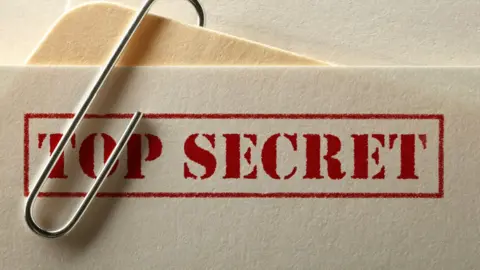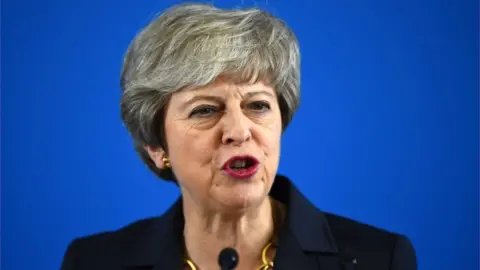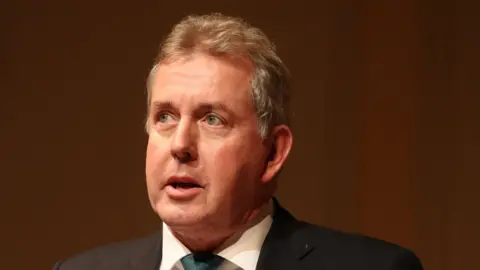Trump diplomatic row: What do we know about leaked UK emails?
 Getty Images
Getty ImagesConfidential emails from the UK's ambassador in Washington which criticised President Donald Trump were leaked over the weekend.
Sir Kim Darroch's correspondence contained a string of criticisms of Mr Trump and his administration, describing the White House as "clumsy and inept".
A formal investigation has been launched by the Foreign Office and in the Commons there have been calls for a police investigation amid widespread anger at the diplomatic fall-out.
Three days after the leak, Sir Kim announced he is to resign as British ambassador to the United States. In a letter to the head of the Foreign Office, Sir Simon McDonald, Sir Kim said he believed it was "impossible" for him to carry on in his current role.
So what do we know about the row so far, and what are the possible consequences?
Was it a leak or a hack?
The Foreign Office has repeatedly called the incident a "leak" rather than a "hack". It originally described the incident as "mischievous" but launched a formal inquiry on Sunday.
Foreign Office minister Sir Alan Duncan dismissed the idea that the disclosure was part of a conspiracy or "Brexit plan" and called it "a despicable leak," adding that "the first premise is that it is a leak from within".
A Whitehall source told The Times: "The involvement of hostile state actors has not been ruled out" - but Downing Street said there is no evidence to suggest the involvement of foreign powers.
 Getty Images
Getty ImagesHow many people had access to the emails?
Asked if ministers, MPs and special advisors would be investigated, the Foreign Office said that it will be for the inquiry to decide who is looked at.
On the question of how many people within government would typically see cables from an ambassador, Sir Alan said that although he was guessing, it could be around 100 people depending on classification.
An ex-British ambassador to the US and a close friend of Sir Kim's said there was a "possible range of villains" who potentially could have released the emails.
Sir Christopher Meyer told BBC Radio 4's Today programme: "It was clearly somebody who set out deliberately to sabotage Sir Kim's ambassadorship, to make his position untenable and to have him replaced by somebody more congenial to the leaker."
How do you investigate a leak?
In the Commons, there have been calls for the police to investigate amid widespread anger at the diplomatic fall-out.
Tom Tugendhat, chairman of the Commons foreign affairs committee, told MPs he had written to Metropolitan Police Commissioner Cressida Dick to "ask that a criminal investigation also be opened".
Sir Alan said police could become involved if evidence of wrongdoing over the leak is found, telling the Commons: "If evidence of criminality is found, then yes, the police could be involved."
In April, following the Huawei leak, Lord O'Donnell, the former head of the Civil Service, revealed that officials in this type of situation may decide to investigate the mobile phone and e-mail records of people with access to the information to try to find who was responsible.
 PA
PAWhat are the penalties?
The person or people who leaked the emails to the Mail on Sunday could potentially be liable for prosecution under the Official Secrets Act.
Prosecutions under the legislation are rare but not unheard of. The maximum punishment for leaking documents is two years in prison or an unlimited fine.
